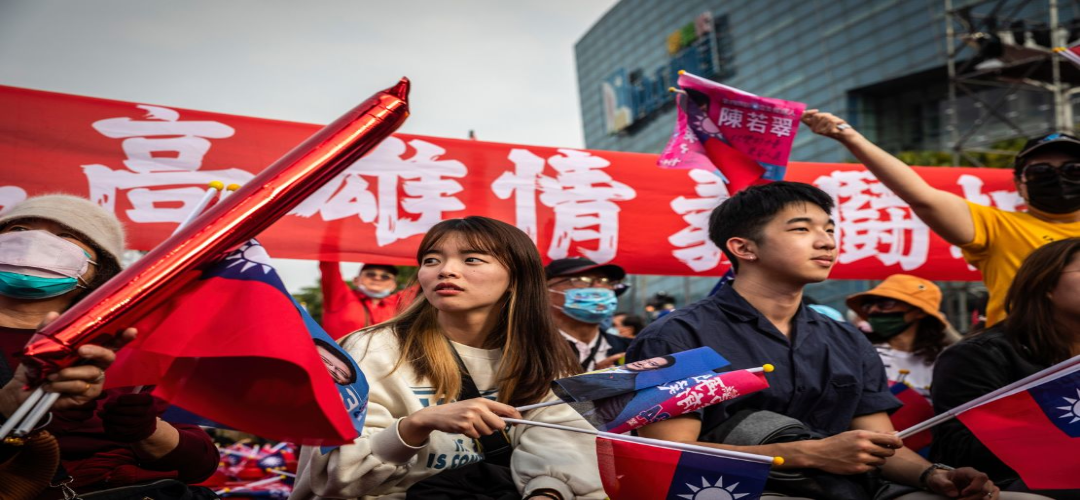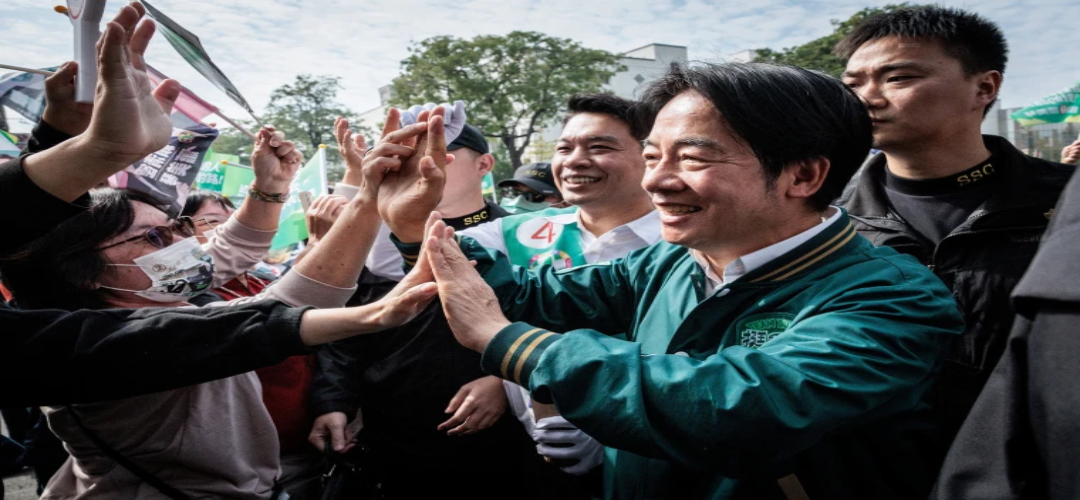Taiwan Elections: High Stakes?
January 13, 2024 | Expert Insights

Taiwan’s election on Saturday, January 13, will be the first of more than 40 national elections that will take place in 2024, a landmark year for global polls. Amid elevated U.S.-China and Indo-Pacific tensions, all eyes are on the high-stakes election that will determine Taiwan’s president and legislature.
Despite its small population of 23.5 million, the island’s election is geopolitically significant because of its disputed political status that has riled up strategic tensions in the region and become a major potential flashpoint in U.S.-China rivalry. Its position at the apex of the highly competitive and critical semiconductor industry pyramid also gives this small island nation importance far beyond its size.
Background
While the archipelago broke away from mainland China in 1949 after the Nationalists lost the civil war to the Communists and declared themselves as the true inheritors of the Chinese nation, the Chinese Communist Party (CCP) controlled PRC considers it as a breakaway province, awaiting an inevitable unification. Taiwan’s political scene and its internal tussle between pro-independence and pro-unification parties have been closely monitored (and interfered with) by Beijing.
The main contenders in the current election are the ultra-conservative and Beijing-aligned Kuomintang (KMT) and the centre-left and Washington-friendly Democratic Progressive Party (DPP), which has governed the island for the last eight years. The smaller Taiwan's People Party (TPP) positions itself between both parties on the political spectrum. Since its first democratic elections in 1996, Taiwan's government has alternated between the two leading parties.
This year, the DPP’s William Lai Ching-Te, emphasizing Taiwanese autonomy and security, is the frontrunner. The KMT lags after failing to agree on a joint ticket with the smaller TPP to oppose the incumbent DPP.
Many domestic issues concern Taiwan's population, such as a stagnant economy, high housing and living costs, energy issues, and education. An ageing population, a significant income gap, and low minimum wages are further issues. Yet, the presidential election is often pervaded by the question of Taiwan's political status.
The incumbent DPP won the 2020 elections by a landslide. The situation significantly influenced the political context in Hong Kong, where Beijing had tightened its grip instead of offering it semi-autonomy as promised (one nation, two system principle). This added to Taiwanese suspicion of Beijing, which had offered a similar deal to Taiwan if it accepted Beijing’s sovereignty over it.

Analysis
For Taiwan, the China factor is not just a question of security but also a question of risk and economic expectation. Voters will have to consider the economic benefits of a better relationship with China that the KMT offers as against the more conflicted relationship with China that the incumbent DPP has had with the continuous risk of Chinese aggression.
Despite the political acrimony between Taiwan and its powerful neighbour, China remains its top trading partner. Cross-strait trade amounted to $205.11 billion in 2022 (The Japan Times, December 25, 2023).
According to the KMT, Taiwan's stagnant economy results from its fractious relationship with Beijing, causing it to lose revenue like tourism income; China has banned tourism to Taiwan. It also recently ended tariff reductions on many chemical exports from Taiwan and threatened further sanctions.
This economic pressure comes in the backdrop of military intimidation with Chinese naval ships entering the Taiwan Strait and almost daily flight forays by the People’s Liberation Army into Taiwan’s air defence identification zone. Beijing’s abundantly clear aversion to the DPP may no doubt exert pressure on the voters. Yet, the intimidation could also backfire and push voters to choose the DPP as they grow increasingly wary of Beijing.
If the DPP and Lai win, onlookers are bracing for Beijing's reaction, ranging from military exercises in the Taiwan Strait to economic sanctions and other pressure tactics like interrupting critical supply chains. China may also adopt a wait-and-see response to gauge the new government's approach.
If the opposition loses the presidential election, it could still manage to win a majority in parliament, the Legislative Yuan. This would curtail Lai’s capacity to pass certain policies, which would sit well with Beijing. A hung parliament, one in which no single political party or coalition has a majority, is likely to encourage Beijing to work with the opposition and sidestep Lai.
Regional neighbours are keeping a sharp eye on the elections, which could trigger military conflict and supply chain disruption in the Asia-Pacific.
If Lai wins, Taiwan is likely to strengthen unofficial ties with the U.S. and Japan. A KMT government is also likely to maintain security ties with Washington and Tokyo but may not be as cooperative as the DPP.
Tokyo, keen to counter its aggressive neighbour’s growing influence, will likely welcome a DPP victory but will be on high alert for Beijing's retaliation. Washington may share this sentiment but will also be keen to maintain the status quo since it opposes formal independence for Taiwan.
Taiwan's current president, Tsai Ing-wen of the DPP, implemented the New Southbound Policy to expand regional engagement and highlighted India as a key priority. Over the past four years, India and Taiwan have made gradual but material progress in their relations. India has moved from abiding by China's red lines to developing distinct relations with Taiwan. Naturally, India is watching closely, too.
Assessment
- The election results will likely impact the Indo-Pacific region's strategic balance. A Lai-led DPP win may lead to intensified military, political, and economic pressure from China. This will likely spur tensions in the Indo-Pacific as the USA and its allies in the neighbourhood, like Japan, India, South Korea, Vietnam, and the Philippines, gear up to counter Beijing.
- Yet, if the DPP does not win an accompanying majority in parliament, Beijing may be more willing to bide its time and work with the opposition.
- On the other hand, an opposition win in the presidential election and parliament could lead to less fractious relations with Beijing and bring Taiwan some respite from its economic and military pressure. However, it may lead to more distant ties with Washington, Tokyo, and India as the government leans towards Beijing.








Comments